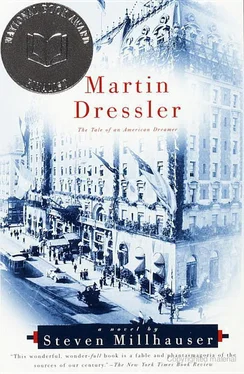For if it was true that Claire Moore had taken up with Caroline, watched her admiringly, seemed to dote on her, it was also true that Caroline in her quieter way was preoccupied with Claire Moore. Martin could feel her soaking up Claire Moore, absorbing her moods, taking her in. Sometimes Caroline would raise her hand in a way Claire Moore had; once, drawn for a moment into the swirl of Claire Moore’s talk about a play they had seen, she began to speak and broke off to search for a word, and the precise tilt of her head, the precise manner in which she tightened her eyebrows in thought, brought Claire Moore sharply to mind. But more than this was the intensity with which Caroline listened to her friend, watched her even when she wasn’t watching her, seemed to take in the talk through the tendons of her neck. She appeared impatient sometimes, as if she wished the dinner would end, and it was true enough that Claire Moore seemed to enjoy prolonging the dinners, seemed to enjoy talking to the others and especially to Martin, whom she liked to draw out on the subjects of modern living, the proposed subway system, steel-frame architecture, the future of the Upper West Side. As Martin spoke, he could feel Claire Moore listening closely to him, penetrating him with her attention. Two chairs away, Caroline sat with her eyes lowered, one hand resting tensely beside her plate.
“Caroline’s jealous of you,” Emmeline said one evening after Margaret had retired upstairs.
“That’s ridiculous,” Martin said, but even as he spoke he saw that it wasn’t. Claire Moore was looking at Caroline a little less often, turning a little more often in his direction; without in any sense ignoring Caroline, she was shifting her very slightly from the center of her attention. Martin, who was used to being flirted with by attractive women, detected in Claire Moore no surreptitious looks, no secret signs; but he could feel in her, as she sat down to dinner, as she placed her forearms on the table, as she turned to him with a question and shook back her hair, a quickened interest.
“I’m not mistaken about these things,” Emmeline said firmly. It was plain for all to see that Caroline had a little “crush” on Claire Moore, who was tiring of her; she’d had little crushes before, little intense friendships with women that flared up because of someone’s interest in her. Take the case of Catherine Winter. At the age of twelve Caroline had taken up with Catherine Winter, a slightly older girl with jet-black hair, a sharp wit, and a passion for music, as well as a gift for drawing cruelly satirical sketches of family members. But above all Catherine Winter had the gift of bringing Caroline out of herself, of animating her, of filling her with feelings. The girls quickly became inseparable. The trouble was that whereas Catherine Winter was enough for Caroline, Caroline wasn’t enough for Catherine Winter, who was drawn to Caroline’s quietness but made friends easily and liked social occasions. Caroline, who wanted Catherine Winter all for herself, began making demands, but demands were precisely what one didn’t make of Catherine Winter; there was an argument, tears, and then — silence. Caroline refused to talk to Catherine Winter again, who for her part threw herself into the social round. Caroline shut herself up in her room and wouldn’t speak to anyone for a week — not even to Emmeline, whom she always turned to in the end. Emmeline herself had grown to be a watcher of Caroline’s moods, a student of her sorrows; and while she suffered for Caroline, she had also begun to sense in these little friendships a dubious element. For if Caroline, through her friendships, was trying to achieve a kind of independence from her sister and mother, her efforts took the form always of a new dependence, a kind of desperate fanatical clinging, which was bound to end in defeat. But Caroline wasn’t the only victim, for from the beginning Emmeline had sensed in those friendships an attempt, hidden perhaps from Caroline herself, to make Emmeline jealous, to hurt her by parading a rival. Oh, make no mistake about it, there was a touch of vindictiveness in Caroline’s little passions.
Martin was surprised by the turn in Emmeline’s analysis, which was accompanied by a slight change in her face, as of a tightening of unseen muscles. And feeling a sudden impulse to protect Caroline from a kind of passionate harshness in her sister’s pursuit of hidden things, he tried to turn her attention away from Caroline to Claire Moore, who, he argued, whatever else might be said about her, couldn’t really be blamed for striking up a friendship with Caroline. But Emmeline would have none of it. Claire Moore, she said, was a bored, idle woman with too much time on her hands, who had taken up Caroline as a hobby. Caroline had been glad to be taken up, but she had begun to make demands of her own, she had begun to be difficult, had begun to be Caroline — too difficult, too Caroline by far, for the likes of Claire Moore, who, to be fair to her, had seemed to like Caroline at first. Now she was tiring of her, she had used her up, she found Martin more amusing. For Claire Moore was a kind of woman that Emmeline had observed more than once — a woman empty within, hungry to be filled, a vampire woman, drinking the blood of victims.
Martin, struck by something Emmeline had said, asked suddenly: “And do you think Caroline is too difficult for me?”
Emmeline considered it. “I didn’t think she would be,” she then replied.
The end came quickly: one evening when Martin sat down to dinner the fifth chair was empty. Caroline said nothing. The empty chair remained for two more nights and then disappeared.
“She’s dropped her,” Emmeline said.
“You were right, then. Poor Caroline!”
Well, yes, Emmeline said, of course: poor Caroline. But had he ever considered that Caroline’s suffering had an effect on those around her, an effect of which poor Caroline could not be unaware? For with her pains, her headaches, her insomnias, her suffering, poor Caroline drew on the sympathies of those who cared about her: she became the center of her family’s attention. For in her quiet way, poor Caroline did like to be the center of attention. Yes, you could almost say that poor Caroline tyrannized over them through suffering, punished them with her pain.
A few nights later, Claire Moore appeared with a black-haired woman at another table, across the room, laughing and shaking back her hair. It struck Martin that if she had dropped Caroline she had dropped him too, and he had so strong a desire to be at that table that he had to force himself not to glance across the room like an injured lover. Caroline sat looking at her plate; two little lines of strain showed between her dark eyebrows. Emmeline sat looking at Caroline.
There was a sharp bang. Martin started.
“What’s that?” cried Margaret Vernon.
“It’s nothing,” Emmeline said.
Caroline, reaching for her glass of water, had knocked over the salt.
MARTIN STARED AT THE SPILLED SALT AND thought of the sharper bangs ten blocks north, where blasting had already begun; they were going down, deep down, deep enough for seven subterranean levels and a basement. Lellyveld and White had balked at the new plan, they had raised innumerable objections to the sketches and blueprints, until Martin and Rudolf Arling had risen together in anger, threatening to take the sketches elsewhere — a bluff, really, though the anger had been genuine enough. And Lellyveld had backed down, as if he had only been waiting for them to rise against him before demonstrating his magnanimity. Martin in any case had gotten what he wanted: space to breathe in. The New Dressler would rise twenty-four stories and would incorporate more boldly the idea of inner eclecticism shadowed in the old. Harwinton, who was kept informed of developments, planned what he called a mystery campaign, to pique the public interest. Even as the hoarding went up, the first posters appeared: against a black background stood a large question mark, bright yellow.
Читать дальше












